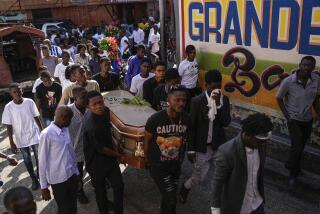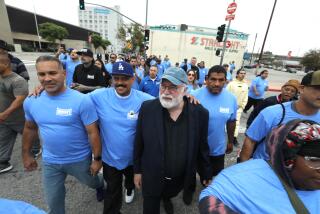When a Homeboy Dies, No One Rests in Peace : The funeral of a gang victim has its own ritual, from expressions of grief to talk of revenge--when the cycle begins anew.
- Share via
They shot Rusty last night.
He was standing in front of a house in East Los Angeles. A car drove up, someone yelled out the name of a rival gang and fired. Rusty fell dead, the bullet shattering his skull.
When I found out at 2:30 in the morning, I couldn’t picture him. As I tried to remember his face, my mind turned instead to the ritual that would begin in the morning, the numbing ritual we’ve been through too many times this year.
His homeboys will come to the church and ask permission to use the parking lot for a car wash or two to help his family with the funeral expenses.
Then the homegirls will come around asking for coffee cans and pickle jars and plastic pitchers--anything they can use to go door to door collecting funds for the funeral. We have the cans and jars and pitchers in the rectory office. All we need to do is tear off last week’s label and put “Rusty” in place of “Chopper.”
Tomorrow, someone will bring a picture of Rusty, maybe a Polaroid with his girlfriend, maybe a snapshot with his homeboys. They’ll cut his picture out and bring it to the copier, and make hundreds of copies. Later in the week, they’ll make copies of copies, Rusty’s face growing dimmer with each batch of flyers announcing his death.
Day after tomorrow, they’ll start asking when the funeral will be. As always, we won’t know for certain until the day before. Shooting victims go to the coroner’s office, and Rusty will lie there until his turn comes in the weekend carnage. Usually, Friday night victims have Thursday funerals, Sunday’s dead are buried the following Monday. Those who die on Saturday night fall somewhere in between, and the church clears the calendar as much as possible.
When the funeral day is set, his friends will put together a booklet. It will have a drawing on the cover, a rhyming tribute from his closest friend and a tearful goodby from his girlfriend. Page 1 is always a paragraph or two decrying guns and gang violence. It is always written by one of the girls, and at some point in the funeral service it will be read to ears that hear but don’t listen.
Everyone at the funeral will receive a booklet. Rusty’s will be the fourth in my 1990 collection.
At the evening funeral, his homies will have new black T-shirts; their own names will be on the front, “In Loving Memory of Rusty--R.I.P” on the back. Tears will flow, the choir will sing and two or three people will take pictures of his body, the homies, the flowers, his coffin.
The morning of his burial, we’ll open the church at 7. We’ll get in our cars at 9, and the line to the cemetery will clog the freeway. After the service, the crowd will linger, not wanting to leave, not knowing what to do. There will be talk of getting the ones who did it, and in more private moments, of gang-banging no more. Then slowly but surely, we’ll leave Rusty among the fallen homies and life will begin to return to normal--until another round of bullets finds its target some night.
When I heard about Rusty, I could only see the upcoming week. Then I began to picture him and remember his voice and his humor. Even now, my sadness only breaks out in brief moments, because more than anything else, I feel sick. It is the sickness of seeing evil destroy its victims anonymously, and of feeling powerless to stop the process. What makes it worse is that this evil is ours, home-grown right here in our city, and its victims are not anonymous; they are young men I know and love.
We will stop this evil only when Rusty and Chopper and Flaco and Trigger are something more than mere names. When their faces are clear to all of us as the photos in our wallets and purses, there will be hope for the future. Until then, those of us in the war zone will hold on to their pictures and pray we can feel the sadness one more time.
Father Thomas H. Smolich, SJ, is executive director of Proyecto Pastoral and associate pastor of Dolores Mission Church in Boyle Heights.
More to Read
Sign up for Essential California
The most important California stories and recommendations in your inbox every morning.
You may occasionally receive promotional content from the Los Angeles Times.













